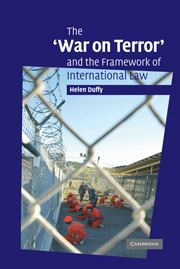Book contents
- Frontmatter
- Contents
- Preface and acknowledgements
- Table of abbreviations
- Table of cases
- Table of conventions
- 1 Introduction
- PART ONE
- PART TWO
- PART THREE
- 6 International humanitarian law
- 7 International human rights law
- 8 Case study – Guantanamo Bay detentions under international human rights and humanitarian law
- 9 Conclusion
- Bibliography
- Index
8 - Case study – Guantanamo Bay detentions under international human rights and humanitarian law
Published online by Cambridge University Press: 06 August 2009
- Frontmatter
- Contents
- Preface and acknowledgements
- Table of abbreviations
- Table of cases
- Table of conventions
- 1 Introduction
- PART ONE
- PART TWO
- PART THREE
- 6 International humanitarian law
- 7 International human rights law
- 8 Case study – Guantanamo Bay detentions under international human rights and humanitarian law
- 9 Conclusion
- Bibliography
- Index
Summary
Following the commencement of the military campaign in Afghanistan on 7 October 2001, the United States, assisted by its allies, began detaining persons in Afghanistan and elsewhere ‘for reasons related to the conflict’. Since early January 2002, hundreds of people, including nationals of some forty states, have been transferred to and held in detention facilities on the United States Naval Base in Guantanamo Bay, Cuba (‘Guantanamo Bay’).
The location of the detention centre on Guantanamo Bay, which the United States authorities claim is beyond US sovereign territory, is an apparent attempt to circumvent the application of human rights protections in the United States constitution and access to United States courts. The detainees are referred to as ‘enemy combatants’, which is then relied upon in turn to justify the non-application of the protections of international humanitarian law. They have been held in what has correspondingly been described as a ‘legal black hole’ or ‘legal limbo’.
This chapter will analyse the application of the framework of international human rights and humanitarian law, set out at Chapters 6 and 7, to the Guantanamo detainees. The ‘plight’ of the Guantanamo detainees raises multiple human rights concerns, but this chapter focuses specifically on the procedural rights of the Guantanamo detainees. In particular, it addresses the right to have the basis of their detention, and status as detainees, determined, if appropriate, by a competent tribunal; to be informed of the reasons for detention; to judicial review of detention; and, so far as the reason for their detention relates to their possible implication in criminal offences, to basic due process guarantees, including access to legal counsel and the right of appeal.
- Type
- Chapter
- Information
- The 'War on Terror' and the Framework of International Law , pp. 379 - 442Publisher: Cambridge University PressPrint publication year: 2005

